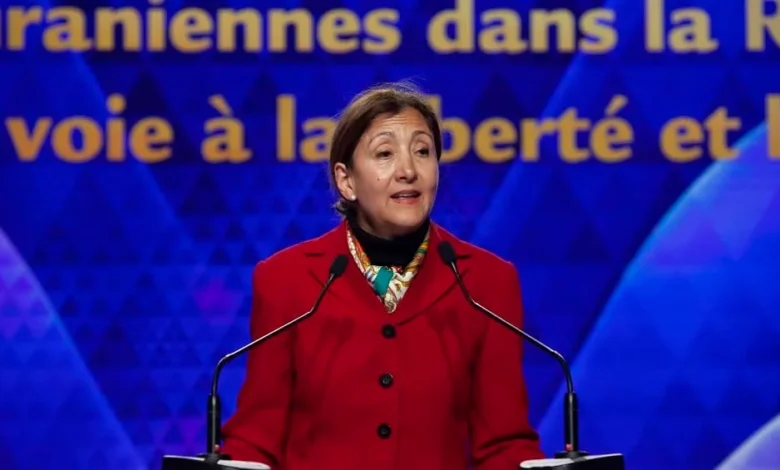Former Colombian Senator Ingrid Betancourt: Our Generation Will Applaud the Downfall of Iran’s Mullah Regime

Ingrid-Betancourt
Written by
Shamsi Saadati
Former Colombian Senator Ingrid Betancourt’s impassioned address at a landmark conference in Paris commemorating International Women’s Day resonated with profound insights and calls to action. The event, attended by prominent female leaders and advocates, served as a touching reminder of the enduring struggle against oppression, particularly in Iran where tyranny and gender inequality prevail.
Mrs. Betancourt opened her speech by acknowledging the significance of the date—March 8th, International Women’s Day—while reflecting on a deeply personal milestone: the anniversary of her own kidnapping by the Revolutionary Armed Forces of Colombia (FARC) twenty-two years prior. “Yesterday was the anniversary, 22 years, of being kidnapped by a communist group, misogynistic guerrilla in Colombia, the FARC,” Betancourt recounted, highlighting her profound understanding and experience in dealing with extremist tendencies.
“The world has witnessed the ongoing series of protests and civil unrest following the assassination of Amini,” Betancourt declared, invoking the tumultuous events of Iran’s 2022 uprising. “We saw the repression in the most barbaric manner. Thousands of people, especially women, and also minors, were killed because they were protesting. And the whole world saw that women were at the forefront of these protests.”
She added, “Mrs. Rajavi said it wasn’t a spontaneous occurrence, and I think it’s important to think about what that means. We must think about what that means, because these women in Iran are facing a gender apartheid, and they have been turned into victims of a brutal regime that suppresses their rights.”
Quoting former French Minister, Mrs. Betancourt added, “Najat Vallaud-Belkacem described this awful situation very brilliantly. And the whole system was built by making the hijab, something that should be worn if one wants to, or not worn if one doesn’t want to, into an instrument of repression. To the extent that one of the leaders of the Iranian regime openly said that women who have not been fixed should be made to feel insecure in public. That’s the goal. The goal is to scare women, to neutralize the power of women. But, and this is what’s impressive, instead of demoralized women, we saw how these women became more determined, more resilient, and more defined.”
Former #Colombian Senator @IBetancourtCol: "The space for #women has diminished. The only place where I feel it hasn’t diminished is here, in the @Mojahedineng, where I feel that women have not only been empowered, but men and women, all together, have embraced the opportunity… pic.twitter.com/WpY8Cvc5Io
— NCRI-FAC (@iran_policy) March 8, 2024
The former Senator emphasized the profound transformation of Iranian women, underscoring their unwavering determination in the face of adversity. “Instead of demoralized women, we saw how these women became more determined, more resilient, and more defined,” Betancourt observed.
“They are no longer protesters, but they have become resistance fighters,” Betancourt declared, “It’s important to link what’s happening because when we see Iranian women leading this resistance movement, we have to wonder how that happened. And it happened because, of course, they were victims of this brutal regime, but also because they had a model of reality. And I want to stress the role of Maryam Rajavi, which has been vital in empowering women and going beyond fear. I have been with Maryam for many years, and I have observed her through many stages.”
Betancourt further celebrated the inclusive ethos fostered within the People’s Mojahedin Organization of Iran (PMOI), where men and women together embrace the opportunity to oppose, confront, and destroy patriarchal behavior to achieve ultimate political change.
She said, “For my generation, the status of women today, we think that we have lost our rights, we have lost our space. The space for women has diminished. The only place where I feel it hasn’t diminished is here, in the PMOI, where I feel that women have not only been empowered, but, and this is very important, it’s the feeling that men and women, all together, have embraced the opportunity they have to live this kind of leadership because they are opposing, confronting, and destroying a patriarchal behavior.”
The address continued with a call to action, highlighting the concerted efforts by the Iranian regime to suppress dissent and demonize opposition movements. Betancourt underscored the regime’s elaborate diplomatic and propaganda machinery aimed at undermining the PMOI and Mrs. Rajavi’s leadership, emphasizing the pivotal role of women in effecting transformative change.
“They [the regime in Iran] have an entire diplomacy built to confront the PMOI and demonize Maryam Rajavi. Not only the people working in embassies, but also terrorists working in embassies, and terrorists plotting, terrorists attacking to annihilate this movement. Do you remember the Villepinte assassination in 2018 and the plots all over the country? If this movement wasn’t important, why bother?”
She added, “Recently, we’ve been informed of leaked messages from the Foreign Minister and the Ministry of Intelligence inside Iran. There is a strategy to pay academics, scientists, and people who normally feel neutral and objective, and say they’re unbiased. But they’re paid by the regime to demonize the PMOI. Imagine the time consumed, the effort, and the energy they put into annihilating this resistance. That’s one of the reasons I’m so happy today. Because we’re here, after many years, we’ve gained momentum. I know we will be the generation that will applaud the downfall of the mullah regime, and that women are the changemakers. Women are the ones who will overcome the regime.”
The former Colombian presidential candidate concluded her profound reflections on the plight of women in Iran, saying, “I know, deep inside me, that these mullahs’ worst nightmare is to have women destroying them. And that’s what’s going to happen. So, with Maryam Rajavi, and with millions of Iranian women, let’s say “We can, and we must.”

